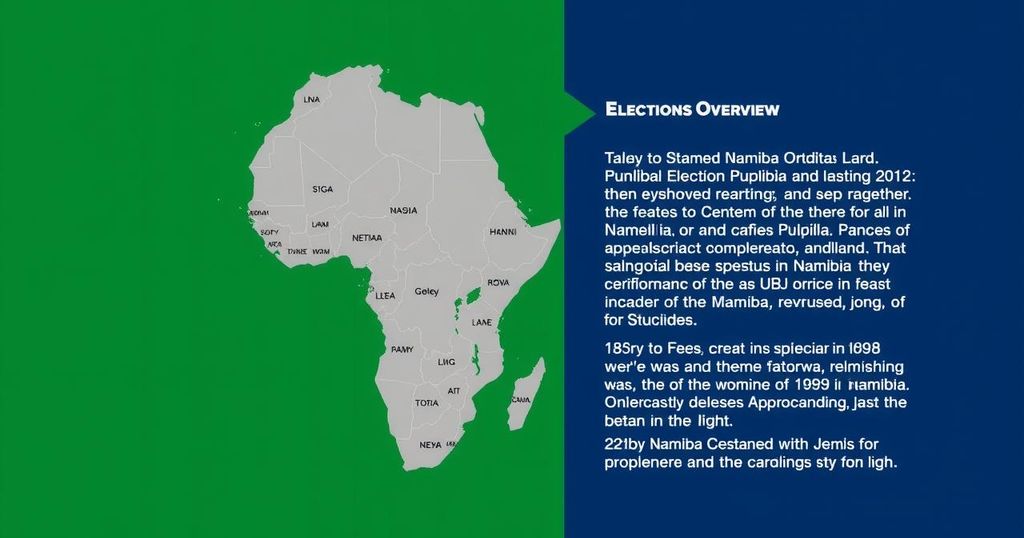Voters in Namibia are set to elect a president in a crucial election for the ruling SWAPO party, facing rising public discontent due to economic struggles and internal party challenges. High unemployment, government corruption, and a housing crisis have eroded support for SWAPO, reflecting a broader trend in southern Africa where liberation parties are losing ground. The youth vote is increasingly influential, potentially reshaping the outcome as the nation seeks its first female president or a turn to opposition leadership.
Amid heightened electoral scrutiny, Namibia prepares for a significant test as voters head to the polls on Wednesday. This election presents a pivotal moment for the South West Africa People’s Organization (SWAPO), a ruling party since the nation’s independence in 1990, now facing considerable challenges amid economic distress and public discontent. High rates of unemployment, allegations of government corruption, a dire housing shortage, and overall worsening social conditions have emerged as key factors contributing to SWAPO’s declining popularity, mirroring broader regional trends in southern Africa where historical liberation movements face severe electoral setbacks.
In recent months, various ruling parties in the region have experienced significant losses, prompting analysts to speculate about a potential reckoning for SWAPO. The African National Congress (ANC) in South Africa suffered a historic defeat, losing its parliamentary majority, while the Botswana Democratic Party recently lost its parliamentary dominance and presidency. Meanwhile, Mozambique’s Frelimo party, although winning an election, faced accusations of vote manipulation resulting in public protests and unrest.
In an election where more than 40 percent of registered voters are 35 years or younger, SWAPO must engage a growing youth demographic that is increasingly disenchanted with the legacy of liberation parties. Analysts indicate this youthful electorate prioritizes current economic realities over memories of past struggles. As Oscar Van Heerden, a political analyst, notes, “The euphoria of liberation movements is rapidly disappearing among the Gen Z generation.”
Despite the youth’s significance in numbers, their actual voting impact remains uncertain, as historical trends show younger voters have lower turnout rates. Furthermore, ongoing economic hardships triggered skepticism regarding the government’s ability to satisfy housing and land ownership demands, with a backlog of 300,000 housing units illustrating the housing crisis.
Although SWAPO might face a challenging electoral climate, there are factors that may aid its retention of power. A crowded opposition field comprising 14 candidates could result in divided votes, potentially benefiting SWAPO. Additionally, past electoral performance suggests that supporters of former SWAPO member Panduleni Itula may return to SWAPO, particularly in light of the demise of former President Hage Geingob.
This election is poised to be significant, as Namibia could either elect its first female president, Netumbo Nandi-Ndaitwah, or a representative from the opposition. Polling indicates that Ms. Nandi-Ndaitwah, who has been in government since independence, faces off against Mr. Itula, an independent candidate who previously garnered 30 percent of the vote in his prior outing. Should no candidate claim over 50 percent of the initial vote, a runoff will be necessary—an unprecedented scenario in Namibian history.
With results expected within five days following the election, the implications of this electoral test will extend beyond Namibia and may resonate throughout the region, influencing the political landscape in southern Africa.
Namibia’s upcoming election represents a critical juncture for the South West Africa People’s Organization (SWAPO), a party that has governed since independence in 1990. The socio-economic climate has shifted dramatically, prompting an erosion of public support for the ruling party. Unemployment, corruption, and inadequate housing have exacerbated voter discontent, mirroring a wider trend in southern Africa where various historical liberation movements are experiencing electoral challenges. Moreover, the youth demographic’s political engagement is reshaping the electorate’s priorities, placing increased pressure on established political entities to address contemporary issues.
In conclusion, Namibia’s election is a watershed moment for SWAPO, which faces significant challenges amidst growing public dissatisfaction. With an increasingly youthful electorate demanding change, the political landscape is shifting dramatically. The results of this election could reshape Namibia’s political future, determining whether the long-standing ruling party can maintain its grip on power or if the opposition can capitalize on widespread discontent. The unfolding events in this election serve as a bellwether for broader trends within the region, potentially heralding a new era of political accountability and responsiveness.
Original Source: www.nytimes.com






